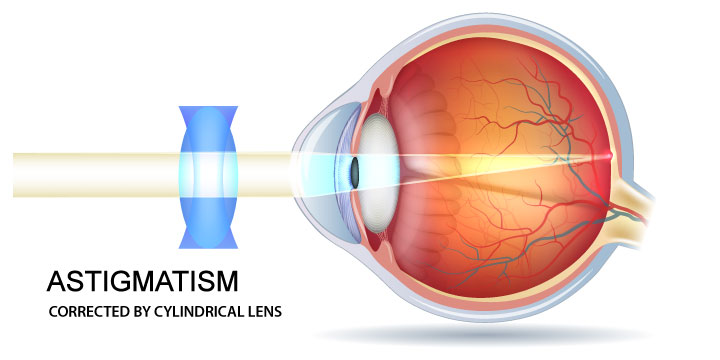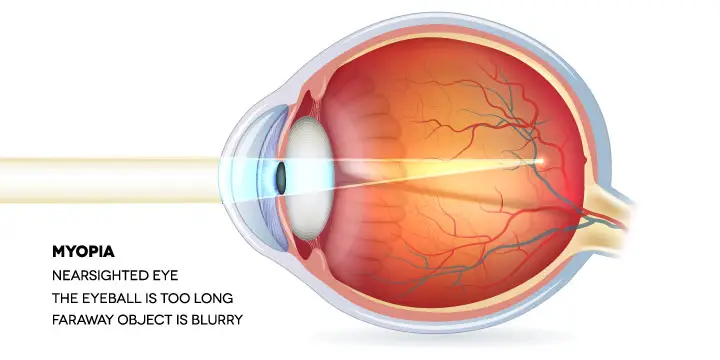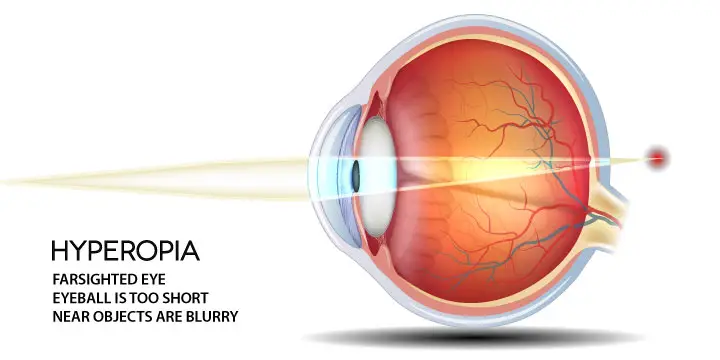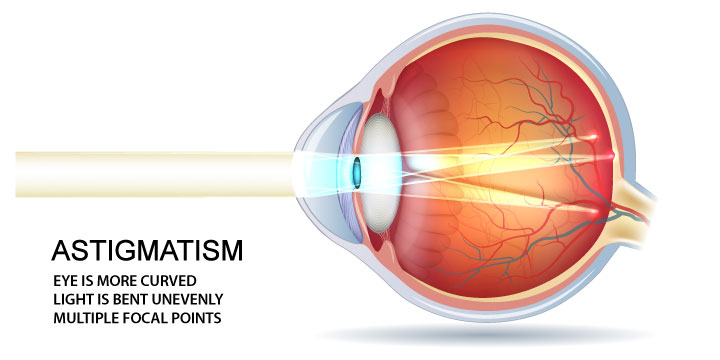Astigmatism - Symptoms, Causes and Treatment
03-05-2024
What is Astigmatism?
Astigmatism is a common refractive error that occurs when the cornea or lens of the eye is not perfectly symmetrical, causing light to be focused unevenly onto the retina. This results in blurred or distorted vision, as the eye is unable to properly focus light rays onto a single point. Astigmatism can occur in conjunction with other refractive errors such as nearsightedness or farsightedness, and can be corrected with the use of eyeglasses or contact lenses designed to compensate for the irregular curvature of the cornea or lens.What Causes Astigmatism?
Astigmatism is caused by an irregular curvature of the cornea or lens of the eye. This can result in blurry or distorted vision at all distances. The exact cause of this irregular curvature is not always clear, but it is believed to be primarily due to genetics. In some cases, it can also be caused by eye injuries, eye surgeries, or certain eye conditions. The irregular shape of the cornea or lens causes light to be focused unevenly onto the retina, leading to the blurriness or distortion that is characteristic of astigmatism.What Are The Risk Factors For Astigmatism?
There are several risk factors that can increase the likelihood of developing astigmatism. Some of these risk factors include genetics, as astigmatism can run in families. Additionally, certain eye conditions and injuries can also increase the risk of developing astigmatism. Finally, factors such as age and certain medical conditions can also play a role in the development of astigmatism. It is important for individuals with these risk factors to be aware of the potential for astigmatism and to regularly visit their eye care provider for comprehensive eye exams.What Are Symptoms Of Astigmatism?
Symptoms of astigmatism can include blurry or distorted vision at all distances, eye strain, headaches, and difficulty seeing at night. Some individuals may also experience double vision, squinting, or discomfort when trying to focus on objects. These symptoms can vary in severity depending on the degree of astigmatism present in the eye. It is important to schedule regular eye exams with an optometrist to monitor any changes in vision and address any concerns promptly.How is Astigmatism Diagnosed?
Astigmatism is diagnosed through a comprehensive eye examination conducted by an optometrist or ophthalmologist. During the exam, the doctor will perform various tests to measure the curvature of the cornea and the shape of the eye's lens. One common test used to diagnose astigmatism is a visual acuity test, where the patient reads letters on an eye chart to determine how well they can see at various distances. Additionally, an instrument called a keratometer, or corneal topographer may be used to measure the curvature of the cornea, while a retinoscope or phoropter can help determine the prescription needed to correct any refractive errors. By carefully analyzing the results of these tests, the doctor can accurately diagnose and assess the severity of astigmatism in an individual's eyes.How is Astigmatism Treated?
Astigmatism is commonly treated through the use of corrective lenses, such as glasses or contact lenses. These lenses work by altering the way light enters the eye, helping to focus it properly onto the retina. In addition to corrective lenses, another treatment option for astigmatism is refractive surgery, such as LASIK or PRK. These procedures reshape the cornea to correct the refractive error causing astigmatism. It is important for individuals with astigmatism to regularly visit their eye care provider for comprehensive eye exams to monitor their condition and ensure their treatment is effective.
Is There A Cure For Astigmatism?
There is no cure for astigmatism, but it can usually be easily corrected with prescription eyeglasses or contact lenses. In some cases, refractive surgery may be an option to permanently correct astigmatism. It is important to have regular eye exams to monitor any changes in vision and ensure that the correct prescription is being used to correct astigmatism.How Can Astigmatism Be Prevented?
Astigmatism cannot be prevented, as it is typically a result of the shape of the cornea or lens in the eye. However, regular eye exams with an optometrist can help detect astigmatism early on and allow for appropriate correction through eyeglasses, contact lenses, or refractive surgery. Additionally, protecting the eyes from injury or trauma by wearing appropriate eye protection sports or safety glasses during other activities can help maintain the overall health of the eyes and potentially reduce the risk of developing astigmatism.Regular eye exams with advanced technologies are essential for the early diagnosis and treatment of astigmatism. Schedule an eye exam with an optometrist today!
Schedule An AppointmentFYEyes Blog Posts

Myopia - Symptoms, Causes and Treatment
A refractive error that affects the eye's ability to focus on distant objects clearly.

Hyperopia - Symptoms, Causes and Treatment
A refractive error that affects the eye's ability to focus on near objects.

Keratoconus - Symptoms, Causes and Treatment
Keratoconus is a progressive eye condition that affects the cornea, causing it to thin and bulge into a cone-like shape.

The Benefits Of Scleral Contact Lenses
cleral contact lenses redefine visual clarity and comfort for individuals with unique ocular needs.

Adult Eye Exams
Our advanced eye exams consist of 25+ modern tests and digital scans to assess eye health, function, and visual acuity.

Child Eye Exams
Give your child a clear future with an annual eye exam from our experienced Edmonton optometrists.

Senior Eye Exams
Maintain your vision through your golden years with gold standard eye care from the optometrists at our Edmonton eye clinic.

Contact Lens Eye Exams
Our eye exams for contact lens wearers include test and digital scans to assess eye health, function, visual acuity, and lens fit.

Diabetic Eye Exams
Managing diabetes requires regular eye exams to ensure that diabetes is not causing irreversible vision loss.

Dilated Eye Exams
Dilating the eyes enables our Edmonton optometrists to see more of the eye so that you many never see less.
Our Edmonton Eye Exams Are Comprised Of 4 Phases Of Evaluation

1. Eye Exam Pre-Testing
Corneal Thickness | Intraocular Pressures | Visual Field
Pre-testing is a detailed process that gathers all necessary information for the optometrist in advance of the optometrist-administered eye examination. This process involves completing a detailed patient history, as well as a series of standard tests. Pre-testing is an essential part of the comprehensive eye exam process, providing valuable information and visuals for both the optometrist and the patient.
More About Pre-Testing »
2. Advanced Diagnostic Testing
Retinal Photography, OCT, Topography
eye-deology Vision Care differentiates itself from other clinics by having the most advanced modern diagnostic specialty testing equipment. Specialty equipment, such as a wide-angle high-resolution retinal imager, Optical Coherence Tomography (OCT), Humphrey Visual Field Analyzer and corneal topographer, ensures that patients receive the best comprehensive eye care.
More About Advanced Testing »
3. Optometrist Examination
Health Assessment & Disease Diagnosis
eye-deology Vision Care Edmonton optometrists perform a multitude of tests and assessments to evaluate ocular health, eye coordination, and visual acuity. In addition, they also evaluate the results of the tests and scans performed during pre-testing. As part of patient education, our optometrists also take the time to show and explain results to patients.
More About Doctor Exam »
4. Eye Glass Consult
Prescription | Lens Selection | Digital Fitting
If you require corrective lenses to improve your vision, our licensed opticians will customize their fit to your unique attributes, needs, lifestyle, and budget. Our opticians are happy to provide you with information about the latest eyeglass frame and lens technologies available so you can make informed decisions and begin seeing and looking your best.
More About Eyewear Consult »